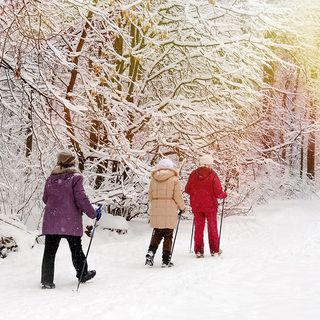
Health
Slowing Down as the World Speeds Up
Slowing down enhances health and well-being.
Posted December 17, 2018
One of the complaints I sometimes hear about aging is that it slows us down. It’s true that we process information a bit more slowly as we age and move at a somewhat slower pace. But overall, it seems to me that slowing down is much more a gift than a loss—one that is especially welcome during the winter holidays (originally holy days) that tend to leave us feeling more dazed than holy (whole). Slowing down and its faithful partner, Paring Down, are inclinations in later life that enhance the quality of life as well as buffering us against the frenzy of the Holidaze.
Slowing Down Enhances Health and Well-Being

The pace of life at this time of year can be overwhelming, dizzying, and numbing. Doing too much and rushing around in an effort to get it all done is stressful, which can raise the amount of cortisol in the body to unhealthy levels associated with high blood pressure, compromised immune functioning, depression, cognitive difficulties, loss of emotional control, fatigue, and a host of other ills.
On the other hand, slowing down lowers stress and blood pressure, enhances decision making and other cognitive functions, and restores emotional equilibrium. In allowing ourselves to experience the present – rather than rushing toward the future – we become more attentive to what is happening around and within us, and to savor it: to taste the apple we are eating, to be moved by the music we are hearing, or to enjoy the glee of children as they climb trees or wade through puddles after a rain shower. Even so-called ordinary moments become extraordinary when we move slowly enough to notice and savor them.
Slowing Down Clarifies Priorities
The growing awareness of our mortality in later life helps bring our genuine priorities into focus and encourages us to let go of less important possessions, commitments, and activities. In a similar way, slowing down brings clarity and supports us in making choices each day that reflect our deepest values. As a result, life becomes more spacious, more meaningful, and more joyful.
In Graceful Simplicity, Jerome Segal notes,
“The time we give to things reflects our values. When everything is rushed, then everything has been devalued . . . To live gracefully is to live within flowing rhythms at a human pace . . . There is time to pay respect to the value of what you do, to the worth of those you care for, and to the possessions you own. Gracefulness is not possible when life is frenetic, when we are harried, or suffer from overload, time crunch, and a vast multiplicity of commitments and pressures.”
Slowness Engenders Harmony
Moving at a slower pace brings a sense of calm and peacefulness and puts us in harmony with others, while rushing not only robs us of the pleasure of the present, it wreaks havoc on how we treat others. I’ve noticed when driving, for example, that when I’m moving at a human pace, I’m much more aware of pedestrians waiting to cross the street and cars that would like to merge into our lane. But when rushing, I sometimes only see them as I drive past – too late to extend them kindness. Much as I appreciate drivers who wait for me to cross or merge, I sometimes revert to rushing and need to remind myself to slow down for my own and others’ sake.
To Each Her Own

Slowing down – like paring down – is a unique process for each of us. Here are a few suggestions that might prove useful in recovering a slower, more human pace at this frenetic time of year:
Take some slow, deep breaths when you find yourself hurrying – and let the exhales last a bit longer than the inhales
Take periodic breaks. It’s paradoxical but true that we actually accomplish more – and do a better job – when we give ourselves time off, rather than plowing through mounds of tasks without a break
Spend time in nature. As cultural anthropologist Angeles Arrien points out in her book, The Second Half of Life,
“In our later years, there is a deep desire to simplify our lives and to return to the enjoyment of our childhood explorations of the natural world. We recognize that it feeds our souls. . . . Nature’s rhythm is medium to slow. . . . [and] there are two things we can never do in the fast lane: we can neither deepen our experience nor integrate it, both essential tasks in the second half of life.”
Treat yourself to reading Carl Honoré’s In Praise of Slowness, a fine book about the high cost of chronic hurrying and the benefits of moving through life at a more human pace. It is a personal account of one man’s discovery of what musicians call tempo giusto—“the right speed”—and also a highly readable history of humankind’s relationship to time and the emergence of Slow and other deceleration movements around the world.
Remind yourself to drive slowly (stay in the slow lane though!) We share the road with drivers of all sorts, and slow cars in the passing lane create stress for faster drivers – and often lead to increased lane changing, (illegal) passing on the right, horn honking – or worse.
Remember to eat slowly – it aids digestion and enhances the enjoyment of one of life’s simplest pleasures.



